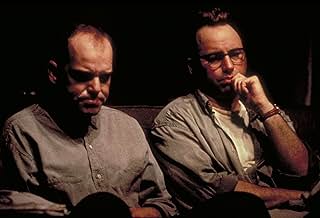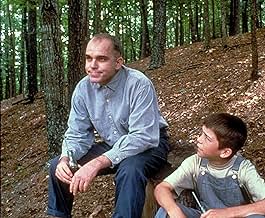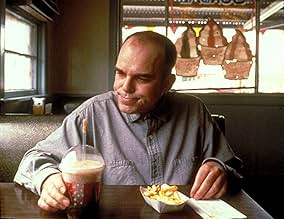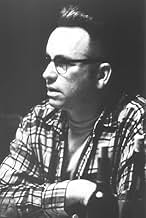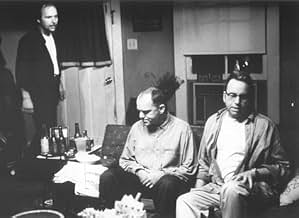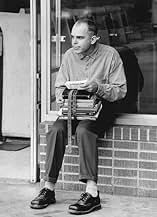Karl Childers, un uomo semplice e già ricoverato dopo essere in ospedale fin dall'infanzia per l'omicidio di sua madre e del suo amante, viene rilasciato per iniziare una nuova vita in una p... Leggi tuttoKarl Childers, un uomo semplice e già ricoverato dopo essere in ospedale fin dall'infanzia per l'omicidio di sua madre e del suo amante, viene rilasciato per iniziare una nuova vita in una piccola città.Karl Childers, un uomo semplice e già ricoverato dopo essere in ospedale fin dall'infanzia per l'omicidio di sua madre e del suo amante, viene rilasciato per iniziare una nuova vita in una piccola città.
- Vincitore di 1 Oscar
- 14 vittorie e 15 candidature totali
Christine Renee Ward
- Melinda
- (as Christy Ward)
Bruce Hampton
- Morris
- (as Col. Bruce Hampton Ret.)
Recensioni in evidenza
10Buddy-51
Set in a small, rural Southern town, Billy Bob Thornton's "Sling Blade" is so flavorful in ambiance and tone, so rich in character and theme that it's hard to believe that its roots are not to be found in any short story or novel. For while it has all the earmarks of a great work of literature, "Sling Blade" is actually an original creation by Thornton, the triple threat talent who wrote, directed and stars in the work.
Karl Childers is a marginally retarded man who's been living in a mental institution ever since, as a child, he accidentally stumbled across his mother and her lover in a compromising position and, in a moment of considerable confusion, hacked the two of them to death. After being officially declared by the state to be "rehabilitated" and "cured," Karl is thrust back out into the world where he forms a bond with a fatherless boy, his hardworking, compassionate mother and a gay storeowner who has long since become a part of their extended family. Also part of that family is the widow's twisted boyfriend, Doyle Hargraves, who physically and psychologically abuses both mother and son.
Thanks to Carl's "strangeness" and homicidal background, as well as the simmering volatility and mercurial temperament of Doyle, there is always the threat of violence hanging ominously over the work. Yet, in many ways, "Sling Blade" is really about the goodness of people in their willingness to overlook external differences and to find the similarities that unite us all in a common bond of humanity. For the most part, the people in this quiet little community try to reach out and befriend Karl, sensing a decency in him that helps to mitigate any possible fear they might have of him based solely on surface eccentricities. Even when he is eventually forced into violent action, he does so as an avenging angel bringing swift and righteous justice, not as a murderous demon acting out of hatred or malice.
The acting in the film - beginning with Thornton himself - could not be more brilliant. With his stooped shoulders, tight-lipped smile, jutting jaw, vacant expression and guttural throat-clearing, Karl became the butt of so many jokes back when the movie first came out that it's easy to forget what a truly amazing character - and job of acting - Thornton has pulled off here. The actor we've known from so many other movies is completely invisible in this role, as he literally becomes Karl in every fiber of his being and, in so doing, forces us to see the wisdom and humanity buried deep inside the person. The performance is such a touchstone of acting for our generation that it is easy to miss all the other great acting in the film, particularly on the part of Natalie Canerday, Lucas Black, John Ritter, J.T. Walsh, Robert Duvall and, most especially, Dwight Yoakam, whose portrayal of a man teetering on the edge of a psychopathic meltdown is bone-chilling and brilliant.
As a writer, Thornton has shaped his film like a modern day parable - simple, symbol-laden and allegorical. As a director, he proves himself a master of rhythm and pacing, setting the mood and allowing the scenes to play themselves out without recourse to overstatement or melodrama. In fact, this is one of those rare movies in which every moment feels just right, so confident is Thornton in his ability as a filmmaker to bring his story to life on screen. He also knows how to make the bucolic setting come across as both stark and sensuous at the same time, a place of quiet stillness that provides the perfect backdrop for the morality tale he is endeavoring to tell. Finally, Daniel Lanois has provided a haunting musical score that ever so subtly draws us into the disturbingly offbeat world of the drama.
"Sling Blade" earned a Best Original Screenplay Oscar for Thornton, but he should also have won awards for his directing and his performance as Karl, not to mention the film itself which should have won the honor as Best Picture of 1996 - although Hollywood, in its infinite wisdom, failed even to nominate it. Ah well, even with that lapse in judgment, "Sling Blade" remains one of the great movie dramas of the past decade.
Karl Childers is a marginally retarded man who's been living in a mental institution ever since, as a child, he accidentally stumbled across his mother and her lover in a compromising position and, in a moment of considerable confusion, hacked the two of them to death. After being officially declared by the state to be "rehabilitated" and "cured," Karl is thrust back out into the world where he forms a bond with a fatherless boy, his hardworking, compassionate mother and a gay storeowner who has long since become a part of their extended family. Also part of that family is the widow's twisted boyfriend, Doyle Hargraves, who physically and psychologically abuses both mother and son.
Thanks to Carl's "strangeness" and homicidal background, as well as the simmering volatility and mercurial temperament of Doyle, there is always the threat of violence hanging ominously over the work. Yet, in many ways, "Sling Blade" is really about the goodness of people in their willingness to overlook external differences and to find the similarities that unite us all in a common bond of humanity. For the most part, the people in this quiet little community try to reach out and befriend Karl, sensing a decency in him that helps to mitigate any possible fear they might have of him based solely on surface eccentricities. Even when he is eventually forced into violent action, he does so as an avenging angel bringing swift and righteous justice, not as a murderous demon acting out of hatred or malice.
The acting in the film - beginning with Thornton himself - could not be more brilliant. With his stooped shoulders, tight-lipped smile, jutting jaw, vacant expression and guttural throat-clearing, Karl became the butt of so many jokes back when the movie first came out that it's easy to forget what a truly amazing character - and job of acting - Thornton has pulled off here. The actor we've known from so many other movies is completely invisible in this role, as he literally becomes Karl in every fiber of his being and, in so doing, forces us to see the wisdom and humanity buried deep inside the person. The performance is such a touchstone of acting for our generation that it is easy to miss all the other great acting in the film, particularly on the part of Natalie Canerday, Lucas Black, John Ritter, J.T. Walsh, Robert Duvall and, most especially, Dwight Yoakam, whose portrayal of a man teetering on the edge of a psychopathic meltdown is bone-chilling and brilliant.
As a writer, Thornton has shaped his film like a modern day parable - simple, symbol-laden and allegorical. As a director, he proves himself a master of rhythm and pacing, setting the mood and allowing the scenes to play themselves out without recourse to overstatement or melodrama. In fact, this is one of those rare movies in which every moment feels just right, so confident is Thornton in his ability as a filmmaker to bring his story to life on screen. He also knows how to make the bucolic setting come across as both stark and sensuous at the same time, a place of quiet stillness that provides the perfect backdrop for the morality tale he is endeavoring to tell. Finally, Daniel Lanois has provided a haunting musical score that ever so subtly draws us into the disturbingly offbeat world of the drama.
"Sling Blade" earned a Best Original Screenplay Oscar for Thornton, but he should also have won awards for his directing and his performance as Karl, not to mention the film itself which should have won the honor as Best Picture of 1996 - although Hollywood, in its infinite wisdom, failed even to nominate it. Ah well, even with that lapse in judgment, "Sling Blade" remains one of the great movie dramas of the past decade.
I remember first watching Sling Blade and thinking, "Oh no, here is a Forest Gump copycat." After all, the main character, Karl (Billy Bob Thornton) was mentally challenged and they were in the South. In reality, that's where the similarities stopped, but I didn't know that at the time. The second detractor for me was Billy Bob Thornton. I had only seen Billy Bob in one movie before Sling Blade and that was Bad Santa (yes I saw Sling Blade for the first time that many years later) and I thought that movie was dreadful, hence my impression of Billy Bob was also negative.
Sling Blade was a welcome surprise. Billy Bob did an excellent job with the role and of course I was doubly surprised to see that he had written and directed the movie.
Sling Blade was terrific in its simplicity. Karl was a simple man, he lived with simple folks in a simple town. That's not to say that they were without problems. Karl's mental handicap, Linda Wheatley's (Natalie Canderday) man issues, Frank Wheatley's (Lucas Black) fatherless issues, Doyle's (Dwight Yoakam) drinking problem, et al. For the simplicity of it all it was simply perfect.
Sling Blade was a welcome surprise. Billy Bob did an excellent job with the role and of course I was doubly surprised to see that he had written and directed the movie.
Sling Blade was terrific in its simplicity. Karl was a simple man, he lived with simple folks in a simple town. That's not to say that they were without problems. Karl's mental handicap, Linda Wheatley's (Natalie Canderday) man issues, Frank Wheatley's (Lucas Black) fatherless issues, Doyle's (Dwight Yoakam) drinking problem, et al. For the simplicity of it all it was simply perfect.
As someone who loves good filmmaking, I rate this film among the best I've ever seen in all areas of the craft. Some of the criticisms of this film are hard to fathom.
The screenplay has the tight conciseness of a well-honed play (which this essentially was derived from) and doesn't fail to prick at the emotions and the intellect of the viewer. The photography, the casting and the editing all click together quite admirably.
However, I always marvel at the negative, emotionalized responses to otherwise superb films such as this by those who seem to miss the entire point of a movie like "Sling Blade".
I did not see a political message about abortion, or a justification of murder or even a backhanded putdown of the rural people of Arkansas. (Many of the characters were locals, by the way.) Some viewers are setting themselves up to be against this film since they are wearing their own feelings on their sleeves and fail to see the subtle layers of the story. They are seeing only the reflection of themselves on the surface of the water, rather than the complex world below.
Theater and film are rooted in images and characterizations designed to help us explore the human condition. It was once said that Tolstoy's voluminous novel "War and Peace" could be summed up in a single sentence thereby negating the need to write the book. Art is not a fast explanation, but a captivating and thought-provoking trip that hopefully forces us to think about our own motivations. Taking a one-dimensional view of this film might lead one to believe that Karl Childer's central message is that we should all eat biscuits smeared with mustard.
"Sling Blade" excels at the job of making us examine the terrible choices life gives us by providing a set of characters who interact in a moving, curious and revealing way. It is not reality nor is it political, but a method by which we can look at our own individual realities.
Others who seemed disenchanted with this film out-of-hand are those who found it "slow". Helloooo! This film is SUPPOSED to be slow and agonizingly so. It is carefully walking you to the conclusion, step-by-step, so you can squirm uncomfortably at the overall foreshadowing. It ain't an explosion-a-minute John Woo filmmaking and it certainly isn't light comedy, though it induces a surprising number of smiles.
This is a film that makes us look at true evil in the form of J.T. Walsh, Dwight Yoakum and Robert Duval's characters and compare it to the pure goodness of the damaged creature portrayed by Billy Bob Thornton, whose own brutalization leads him to seek justice in his own imperfect way.
To help those out who didn't "get" this film, I might recommend that you consider Thornton's character to be an amalgamation of Herman Melville's innocently homicidal protagonist in "Billy Budd" and Mary Shelley's sad monster Frankenstein. These characters, like Thornton's Karl Childers, were dramatic vehicles for the purpose of making us think. They did bad things but we were forced to view them compassionately because they reflected our own conflicting traits.
Don't read things into a film that aren't there, but don't ignore the interesting elements that are. Get those wheels upstairs turning and start enjoying intelligent filmmaking instead of merely seeking an excitement fix!
The screenplay has the tight conciseness of a well-honed play (which this essentially was derived from) and doesn't fail to prick at the emotions and the intellect of the viewer. The photography, the casting and the editing all click together quite admirably.
However, I always marvel at the negative, emotionalized responses to otherwise superb films such as this by those who seem to miss the entire point of a movie like "Sling Blade".
I did not see a political message about abortion, or a justification of murder or even a backhanded putdown of the rural people of Arkansas. (Many of the characters were locals, by the way.) Some viewers are setting themselves up to be against this film since they are wearing their own feelings on their sleeves and fail to see the subtle layers of the story. They are seeing only the reflection of themselves on the surface of the water, rather than the complex world below.
Theater and film are rooted in images and characterizations designed to help us explore the human condition. It was once said that Tolstoy's voluminous novel "War and Peace" could be summed up in a single sentence thereby negating the need to write the book. Art is not a fast explanation, but a captivating and thought-provoking trip that hopefully forces us to think about our own motivations. Taking a one-dimensional view of this film might lead one to believe that Karl Childer's central message is that we should all eat biscuits smeared with mustard.
"Sling Blade" excels at the job of making us examine the terrible choices life gives us by providing a set of characters who interact in a moving, curious and revealing way. It is not reality nor is it political, but a method by which we can look at our own individual realities.
Others who seemed disenchanted with this film out-of-hand are those who found it "slow". Helloooo! This film is SUPPOSED to be slow and agonizingly so. It is carefully walking you to the conclusion, step-by-step, so you can squirm uncomfortably at the overall foreshadowing. It ain't an explosion-a-minute John Woo filmmaking and it certainly isn't light comedy, though it induces a surprising number of smiles.
This is a film that makes us look at true evil in the form of J.T. Walsh, Dwight Yoakum and Robert Duval's characters and compare it to the pure goodness of the damaged creature portrayed by Billy Bob Thornton, whose own brutalization leads him to seek justice in his own imperfect way.
To help those out who didn't "get" this film, I might recommend that you consider Thornton's character to be an amalgamation of Herman Melville's innocently homicidal protagonist in "Billy Budd" and Mary Shelley's sad monster Frankenstein. These characters, like Thornton's Karl Childers, were dramatic vehicles for the purpose of making us think. They did bad things but we were forced to view them compassionately because they reflected our own conflicting traits.
Don't read things into a film that aren't there, but don't ignore the interesting elements that are. Get those wheels upstairs turning and start enjoying intelligent filmmaking instead of merely seeking an excitement fix!
A magnificent film! Watching Billy Bob, I was reminded of Bo Radley (Robert Duvall)in To Kill a Mockingbird. The irony of seeing Duvall in Sling Blade made it that much more rewarding. Yes, it's true, the ending was inevitable, but so what? The journey to the end was what made this film the gem that it is. Dwight Yoakam made my skin crawl, and Lucas Black as little Frank brought out my motherhood instinct. Protect that boy, Karl! And he did. This had all the elements of a great film: an unselfish hero who brings about changes in the lives of others in a meaningful way. Granted, had his mental capabilities been greater he might have made another choice. Given the circumstances of the film, there was no other choice.
No film in recent years has held me as spellbound as SLING BLADE, written by BILLY BOB THORNTON (for which he won an Oscar for Best Screenplay), and starring the actor in a memorable role for which he was Oscar nominated but failed to win.
He becomes the character with such truth--and such emotional underplaying--that he makes the whole story even more moving than it would have been with any other actor in the leading role. He plays a retarded man released from prison after serving twenty-five years for killing his mother and her lover with a sling blade. He felt morally justified because he saw their act of love as evil, only later realizing that it was wrong to kill them.
We follow his release, first accepted with kindness by a local repair shop where he reveals himself to be skilled at fixing motors, then received into the family of a boy he's befriended, played wonderfully by LUCAS BLACK. Unfortunately, the family life is ruined by a violently dysfunctional man called Doyle (DWIGHT YOAKAM) who is a crude bully and redneck full of bitter hatred and resenting the intrusion of Thornton and the boy and possessive in his relationship with the mother.
The biggest weakness in the screenplay is figuring out why the mother would ever be attracted by such a bigoted bully. Yoakam plays him in a ruthless manner that shows no compassion for the character and he's so evil that you have to wonder about the mother's mental faculties in letting him even near the family. It's also hard to believe that she would let the retired man use her garage for shelter on such short acquaintance with her son. But hey, this is a movie, this is the script, and that's it.
All of the acting is uniformly excellent, particularly BILLY BOB THORNTON, who was nominated and would have deserved the Oscar for his penetrating study of a retarded man without a single false note.
Tension builds because the viewer is aware that some sort of confrontation has to happen between Karl (Thornton) and Doyle. It's a matter of waiting to see what develops and that's what keeps the viewer hooked onto the story and wondering how it will conclude.
It's a fully realized slice of life, Southern style with hillbilly overtones, always centered on the main thrust of the story without ever losing its touch, rich in atmospheric detail. J.T. WALSH as a fellow inmate is impressive, as is JOHN RITTER (whom I didn't even recognize at first) as a sympathetic gay man, amazingly real in a serious role. ROBERT DUVALL has a cameo bit as an indifferent father that he plays faultlessly.
Summing up: Brilliant film, highly recommended and involving a very touching relationship between the small boy and the retarded man.
He becomes the character with such truth--and such emotional underplaying--that he makes the whole story even more moving than it would have been with any other actor in the leading role. He plays a retarded man released from prison after serving twenty-five years for killing his mother and her lover with a sling blade. He felt morally justified because he saw their act of love as evil, only later realizing that it was wrong to kill them.
We follow his release, first accepted with kindness by a local repair shop where he reveals himself to be skilled at fixing motors, then received into the family of a boy he's befriended, played wonderfully by LUCAS BLACK. Unfortunately, the family life is ruined by a violently dysfunctional man called Doyle (DWIGHT YOAKAM) who is a crude bully and redneck full of bitter hatred and resenting the intrusion of Thornton and the boy and possessive in his relationship with the mother.
The biggest weakness in the screenplay is figuring out why the mother would ever be attracted by such a bigoted bully. Yoakam plays him in a ruthless manner that shows no compassion for the character and he's so evil that you have to wonder about the mother's mental faculties in letting him even near the family. It's also hard to believe that she would let the retired man use her garage for shelter on such short acquaintance with her son. But hey, this is a movie, this is the script, and that's it.
All of the acting is uniformly excellent, particularly BILLY BOB THORNTON, who was nominated and would have deserved the Oscar for his penetrating study of a retarded man without a single false note.
Tension builds because the viewer is aware that some sort of confrontation has to happen between Karl (Thornton) and Doyle. It's a matter of waiting to see what develops and that's what keeps the viewer hooked onto the story and wondering how it will conclude.
It's a fully realized slice of life, Southern style with hillbilly overtones, always centered on the main thrust of the story without ever losing its touch, rich in atmospheric detail. J.T. WALSH as a fellow inmate is impressive, as is JOHN RITTER (whom I didn't even recognize at first) as a sympathetic gay man, amazingly real in a serious role. ROBERT DUVALL has a cameo bit as an indifferent father that he plays faultlessly.
Summing up: Brilliant film, highly recommended and involving a very touching relationship between the small boy and the retarded man.
Lo sapevi?
- QuizAccording to Billy Bob Thornton in a February 7, 1997 interview on Howard Stern's radio show, Karl living behind a shed is based on a boy where he grew up who could not walk or talk very well, so his parents kept him in a shed out back. Billy said the boy's mother was scared by a snake when she was pregnant, so they felt he was a child of the devil. They kept him locked up and fed him like a dog. It turned out the boy had polio.
- BlooperWhen Karl is talking to the Frostee Cream Boy, there are no cars on the road behind him. But whenever the camera is aimed at the Frostee Cream, there is a lot of traffic on the road reflected in the window. Billy Bob Thornton points out in the DVD commentary that this is because the local police had another pressing issue the day they filmed Jim Jarmusch, and they couldn't be there to stop traffic.
- Curiosità sui creditiThe opening credits start about 18 minutes into the film.
- Versioni alternativeThe Director's Cut runs 12 minutes longer than the original theatrical releases.
- Colonne sonoreThe One I Love
(instrumental)
Written by Ali Jennings and Daniel Lanois
Performed by Ali Jennings
Courtesy of Daniel Lanois, Ali Jennings Songs/Socan, Daniel Lanois Songs/Socan
I più visti
Accedi per valutare e creare un elenco di titoli salvati per ottenere consigli personalizzati
Dettagli
Botteghino
- Budget
- 1.000.000 USD (previsto)
- Lordo Stati Uniti e Canada
- 24.444.121 USD
- Fine settimana di apertura Stati Uniti e Canada
- 28.139 USD
- 1 dic 1996
- Lordo in tutto il mondo
- 24.444.121 USD
Contribuisci a questa pagina
Suggerisci una modifica o aggiungi i contenuti mancanti



